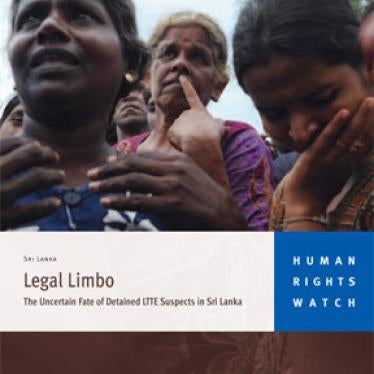The seven ethnic Tamil men waited on the tarmac of a London airport last May, literally minutes from take-off and from being deported to Sri Lanka. British authorities had rejected their applications for asylum, despite increasing information that Tamils suspected of anti-government sympathies faced torture back home.
Two days earlier, in a bid to halt the deportations, Human Rights Watch released new research showing cases in which repatriated Tamils were arbitrarily detained and tortured in Sri Lanka. We challenged British government policy on determining whether Sri Lankan Tamils would be safe back home.
The British media picked up our report and began conducting their own investigations. “Everybody is crying,” one Tamil man told The Independent from his UK detention center. “We all know about cases where people have been tortured or killed after they were returned. Why is the UK government doing this?”
As the men waited in the plane, a British government chartered aircraft, a judge granted a last minute injunction, citing Human Rights Watch’s research as justification for halting the deportation.
Immediately after the ruling, the seven were led off the tarmac and told they could remain in the United Kingdom—at least for now.
The scenario repeated itself on September 20, when another group of Sri Lankan Tamils who were set to be deported received a last-minute injunction.
Sri Lanka’s devastating 26-year-long armed conflict ended in May 2009 with the defeat of the separatist Liberation Tigers of Tamil Eelam (LTTE). Since then the Sri Lankan government has made no progress toward justice for serious abuses committed by both sides in the final months of the conflict, including the government’s indiscriminate shelling that killed tens of thousands of civilians, and the LTTE’s repeated use of civilians as “human shields.”
The flagrant disregard for human life continues. Despite the end of a formal state of emergency, Sri Lankan security forces continue to kidnap, torture and “disappear” Tamils with suspected links to the LTTE.
Repatriated Tamils are no exception. Human Rights Watch’s May news release exposed how at least 13 Tamils, deported by the UK and other countries, were tortured by government authorities on their arrival in Sri Lanka. One woman reported being sexually abused by Sri Lankan agents.
One of the deportees told Human Rights Watch:
I was beaten up and tortured. My head was banged against the wall. I was suspended upside down and burnt with cigarettes. I was handcuffed and shackled throughout and beaten with various objects. My interrogators accused me of being an LTTE agent and tried to suffocate me with a petrol-infused plastic bag.
But we fear these cases are just the tip of the iceberg.
Tamils who have been politically active abroad, protesting against the Sri Lankan government, are also subject to abuse upon return to Sri Lanka.
Within Britain there is a lack of official consensus on the issue. While Britain’s Home Office says that anyone who is deported is individually assessed to make sure that they are not at risk of torture, the UK’s Foreign Office released a report stating that torture of Tamils in Sri Lanka is common.
Still, despite the dramatic showdown on the airport tarmac in May and September, the UK government presses ahead with sending Tamils back to Sri Lanka.
Human Rights Watch is pushing for this to change. We want the UK to suspend all deportations of Tamil asylum seekers until the government updates its policies on the Sri Lankan rights situation used to assess asylum claims.
UK news outlets The Independent and Channel 4 News, which both reported extensively on the plight of the asylum seekers, continue to report on the likelihood of other Tamils being deported, citing Human Rights Watch’s research. This puts additional pressure on the government and helps us keep the story in the headlines.
Human Rights Watch also is seeking justice for military and LTTE abuses, particularly during the final months of the war, when up to 40,000 civilians were killed. Without a serious effort to bring those responsible for war crimes to account, abuses will continue. And as the British and other governments downplay the threat of torture in Sri Lanka, the lives of Tamil asylum seekers hang in the balance.







